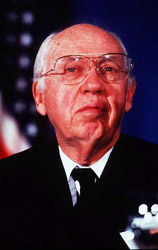William Casey
| Bill Casey | |
|---|---|
 |
|
| Director of Central Intelligence | |
|
In office January 28, 1981 – January 29, 1987 |
|
| President | Ronald Reagan |
| Deputy |
Frank Carlucci Bobby Ray Inman John N. McMahon Robert Gates |
| Preceded by | Stansfield Turner |
| Succeeded by | William H. Webster |
| Under Secretary of State for Economic Growth, Energy, and the Environment | |
|
In office February 2, 1973 – March 14, 1974 |
|
| President |
Richard Nixon Gerald Ford |
| Preceded by | Thomas C. Mann |
| Succeeded by | Charles W. Robinson |
| Chair of the Securities and Exchange Commission | |
|
In office April 14, 1971 – February 2, 1973 |
|
| President | Richard Nixon |
| Preceded by | Hamer H. Budge |
| Succeeded by | G. Bradford Cook |
| Personal details | |
| Born |
William Joseph Casey March 13, 1913 New York City, New York, U.S. |
| Died | May 6, 1987 (aged 74) Roslyn Harbor, New York, U.S. |
| Political party | Republican |
| Education |
Fordham University (BS) St. John's University, New York (LLB) |
William Joseph "Bill" Casey (March 13, 1913 – May 6, 1987) was the Director of Central Intelligence from 1981 to 1987. In this capacity he oversaw the entire United States Intelligence Community and personally directed the Central Intelligence Agency (CIA).
A native of Elmhurst, Queens, New York, Casey graduated from Fordham University in 1934 and earned a law degree from St. John's University School of Law in 1937. His portrait now sits in Molloy College. During World War II, he worked for the Office of Strategic Services (OSS) — the predecessor to the CIA — where he became head of its Secret Intelligence Branch in Europe. He was awarded the Bronze Star Medal for meritorious achievement. The OSS was dissolved in 1945.
Casey ran as a Republican for New York's 3rd congressional district in 1966, but was defeated in the primary by former Congressman Steven Derounian. After practicing corporate law in New York, he served in the Nixon Administration as the chairman of the Securities and Exchange Commission from 1971 to 1973; this position led to his being called as a prosecution witness against former Attorney General John N. Mitchell and former Commerce Secretary Maurice Stans in an influence-peddling case stemming from international financier Robert Vesco's $200,000 contribution to the Nixon reelection campaign. He then served as Under Secretary of State for Economic Affairs for 1973-74 and chairman of the Export-Import Bank of the United States 1974-76. He was a co-founder of the Manhattan Institute in 1978. He is the father-in-law of Owen Smith, Chairman of the Board of Trustees of the Institute of World Politics and Professor Emeritus at Long Island University.
...
Wikipedia
